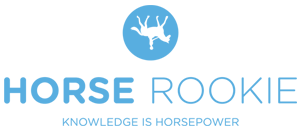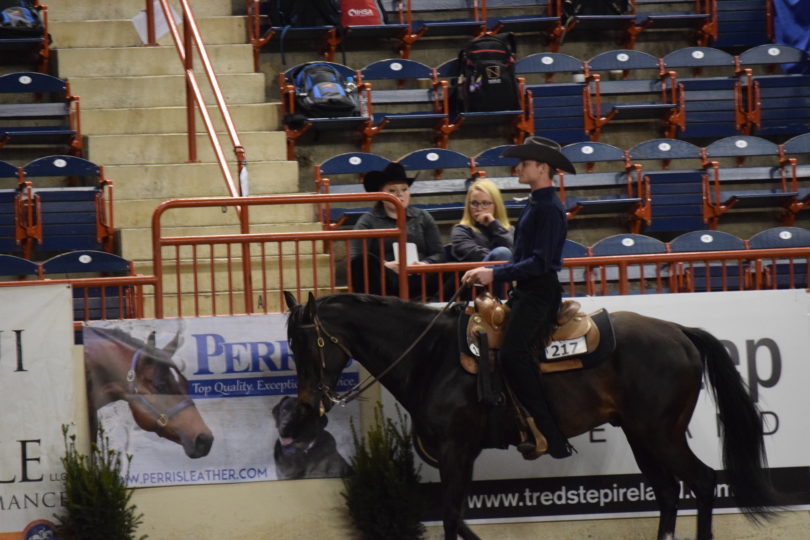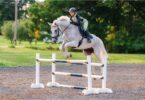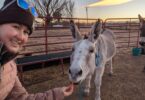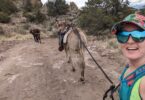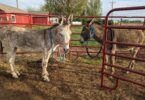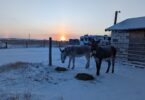College Team: University of Findlay (Learn More)
State: Ohio
Year in College: Junior
Joined Team: 2016 (Junior Year)
Riding Discipline(s): Western all-around events
About Bryant: I am from Greenville, Ohio where I was born and raised with one brother who is a year younger than I am. At the University of Findlay, I am a double major in western equestrian studies and business management. The University has given me many opportunities and keeps me very busy, but when I have free time, I like to read self-growth books, be outdoors, watch movies, and hang out with friends.
Collegiate Equestrian Interview
Q: What was your pre-college horse experience?
Prior to college, my parents have had horses as far back as I can remember. There was a span of a few years where we didn’t have horses, but I begged for us to buy another one because I wanted to show in 4-H. I really didn’t want a gaited horse, but that is exactly what I got. So, my journey in the gaited horse world began.
My horse, Lexi, turned out to be way cooler than I thought she would be. She carried me on trails, through show patterns, and along the rail. We showed together for 8 years in 4-H where we were able to accumulate many grand champion trophies and create many success stories. We also made it to state where we were able to place at the upper end of all our classes. We showed everything: trail, rail, patterns, saddle seat, and even the speed events like barrels and poles.
Lexi taught me much of what I know today because I never had a paid lesson before college!
Q: What were equestrian team tryouts like?
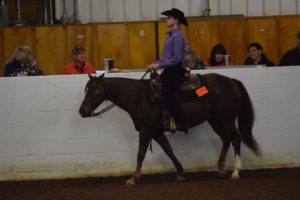 Tryouts consist of riding two horses around the rail, one will be shown at all three gaits one direction and the other at all three gaits the other direction. We also are required to ride the second horse in a pattern. We try out for the division that we would be showing in throughout the year.
Tryouts consist of riding two horses around the rail, one will be shown at all three gaits one direction and the other at all three gaits the other direction. We also are required to ride the second horse in a pattern. We try out for the division that we would be showing in throughout the year.
Additionally, we are supposed to wear nice jeans, a button down, and a hat. Our team tryouts are very competitive and not everyone can make the team, so they can become stressful very quickly.
However, our coaches are very good at also considering work ethic of riders, as well as coachability. It’s best to think about all you have accomplished and what qualifies you for the team instead of flaws that we all have. We find out if we made the team through a posted sign with the names of riders who made the team under each division.
Q: Describe a typical week on the team.
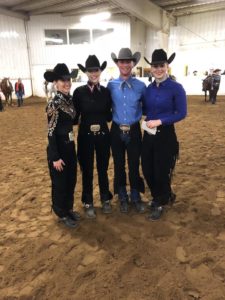 A typical week on the team includes one practice which is about an hour ride where we get to ride several different horses. We practice rail work, patterns, and sometimes we will do drills such as splitting poles in order to get the feel for the horse’s legs. Additionally, a week encompasses a workout where our team uses core exercises and running to get in better shape for riding with a stronger seat and position.
A typical week on the team includes one practice which is about an hour ride where we get to ride several different horses. We practice rail work, patterns, and sometimes we will do drills such as splitting poles in order to get the feel for the horse’s legs. Additionally, a week encompasses a workout where our team uses core exercises and running to get in better shape for riding with a stronger seat and position.
We also volunteer twice a year in our community. I like to volunteer at Challenged Champions, which is a business that allows individuals with developmental disabilities to ride horses. The team volunteers as side walkers there. Home shows require us to have meetings to prepare, and the evening before the show is a time for cleaning, clipping, and preparing both horses and our facility.
During the day of a show, we are required to hold horses, announce, ring steward, pass out ribbons, manage the holding pin, and be prepared for our classes. It can be stressful, but it is exciting and fun to be around the camaraderie.
Q: What type of riding did you choose and why?
I compete in horsemanship in the novice division. I compete in horsemanship because I love how difficult it is. The challenge makes me keep growing and learning all the time. I love the skill, timing and precision that horsemanship requires, and it is interesting to see how different horses react to my riding. A sharp, clean horsemanship pattern just makes me happy because there is a connection between horse and rider that is like no other.
Outside of the team, I compete in all-around events because there are many events that require the horse and me to be skilled at many different things.
Q: What are some challenges of balancing academic and equestrian responsibilities?
The biggest challenge for me is that there is not very much time in each day. My responsibilities in addition to the team include working for an instructor at the University of Findlay and a full course load of classes. In order to manage these tasks, I keep lots of open communication with my boss, coaches, barn managers, and my professors on campus. I prioritize my responsibilities in chronological order.
Also, I get up at 5:15am every day and typically don’t get to sleep until around 11pm. Getting up early and staying awake late helps me to gain more time to do homework and try to maintain a social life.
Q: What’s one “rookie mistake” you made?
One horse related “rookie mistake” that I have made is to not properly prepare my horse for a show. Every semester at the University of Findlay for my equestrian major, we get to show against our classmates as if it were a real show. I thought I had trained my horse well and I probably did, but I had not worked my horse on the rail a ton.
When I went into the western pleasure class, my horse acted as if he didn’t know how to put his head down and he had no idea how to move slowly. In the second western pleasure class that I went into, I moved my horse away from the rail, and I had the same horse that I thought I did.
The lesson that I learned from this event is that you must work on every aspect that will happen in a show. Don’t forget the little things like horses passing closely, riding on the rail, and riding in your show position.
Q: What have horses taught you?
Horses have taught me important life skills like hard work, patience, and determination. They have given me responsibility for their life and their care, which has given me work ethic. In order to maintain a horse’s health and to grow their training, I must work hard. When training is not going the way that I want it to or if a horse is fighting to learn what I want them to, I must remember patience otherwise the training will go backward.
Determination keeps me striving for the result that I want. I must keep trying to get a horse to do the things I want… or it never will!
Horses have been a huge factor in my learning to ride with communication, feel, timing, and rhythm, not just because they are the creature that I am riding but because they will tell me when I am doing something wrong.
Sometimes, I must change what I am doing to get the result that I want. This takes communication and a sense of timing. Timing, rhythm, and feel are acquired by riding new horses that require a refined skill and better techniques.
Q: If you could travel back in time to your first day on the team and give yourself one piece of advice, what would it be?
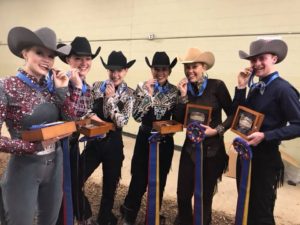 If I could travel back in time and give myself one piece of advice, I would tell myself that I am not going to win everything and that is a good thing! Often times, I get far too competitive. I want to place first really badly, and I am very hard on myself when I do not. I start believing that I am a poor rider even if my ride was good. I knew that it was good to place second sometimes, and I would start looking for what was good about it.
If I could travel back in time and give myself one piece of advice, I would tell myself that I am not going to win everything and that is a good thing! Often times, I get far too competitive. I want to place first really badly, and I am very hard on myself when I do not. I start believing that I am a poor rider even if my ride was good. I knew that it was good to place second sometimes, and I would start looking for what was good about it.
To start with, it would be good because it would make me see that I can learn from what the winner was doing better than what I was doing. Additionally, I think it is always good for a rider to be humbled by a loss. There is always someone better than you!
I wish that I had always taken a second as a learning opportunity instead of a loss or failure. Lastly, the placings are only the opinions of one person standing in the middle, and there are a lot of other judges who just may have placed me as first.
Q: Why should students join a college equestrian team?
Students should join a college equestrian team because it improves their riding abilities by leaps and bounds. There is nothing like the opportunity to show horses that you have never ridden before. It teaches communication, timing, rhythm, feel, hard work, patience, and determination. Equestrian teams ignite competition amongst peers, but it also encourages teamwork to host a show or cheer on other riders. College teams push you to be better and better because you don’t want to let the team down.
Being on a team also opens so many opportunities to creating an excellent network within the equine world if you ever plan to make a career in the industry. You can meet tons of very successful people who have probably been where you are right now. They may become great mentors. Through the networking, you will make many new friends and have experiences that you will only get once in a lifetime.
[youtube https://www.youtube.com/watch?v=4DhGmevNGdc]Q: What’s one piece of gear you can’t live without?
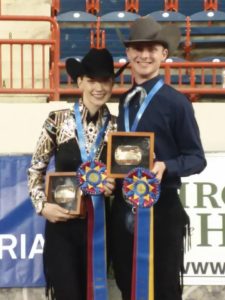 In thinking about one piece of equipment I cannot live without, I come up with two items that could answer this question: a grey cowboy hat that I saved for a long time to get and a square national champion buckle that I worked extremely hard to earn.
In thinking about one piece of equipment I cannot live without, I come up with two items that could answer this question: a grey cowboy hat that I saved for a long time to get and a square national champion buckle that I worked extremely hard to earn.
Both of these items have something in common that I think all riders should keep in mind in finding one piece of gear that they can’t live without. Firstly, the hat is uniquely grey instead of standard black. Secondly, the buckle is square instead of round. I point this out because these items not only make me stand out in the arena, but they also show my personality in that I want to be different.
Q: Who is your favorite horse to ride and why?
My favorite horse to ride in our barn at Findlay is named Barbie. She is a western pleasure style horse, and I like her the most because she goes around the arena nicely with her head down and at a slow pace that is easy to sit. This makes her easier to show than other horses. She is also handy for patterns, which makes me feel like a good rider.
About the Team Shop Horse Rookie Riding Essentials Meet More StudentsEnjoy this article? Trot on over to:
- Horseback Riding in College: Tips from Alexi Neilsen
- See Why Findlay Made Our List of the Best Equestrian Colleges
- 10 Best Stirrups for Jumping Clear (and Staying Safe)
- Shelby Dennis: Best Horse Riding Advice & Rookie Mistakes
- Horseback Riding: What to Wear (With Pictures)
- Equestrian Media Guide (Vlogs & Podcasts)
